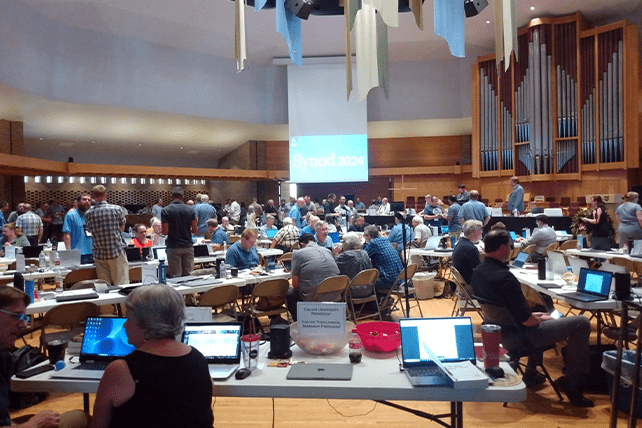GRAND RAPIDS, Michigan (RNS) — At its annual national meeting this week, the Christian Reformed Church in North America, one of the oldest denominations in the United States, voted 134-50 on Wednesday (June 19) to put congregational leaders on “limited suspension” if their churches publicly welcome LGBTQ+ members, violating the CRCNA’s official stance on same-sex relationships.
The synod also voted Tuesday (June 18) to tighten rules for how congregations voice their differences with the ruling body of the denomination and asked for new resources for dissenting churches as they seek to realign or disaffiliate in the wake of the week’s decisions.
Like other Christian denominations in recent years, the CRCNA has been debating inclusion and participation in church life for LGBTQ+ individuals and couples. Two years ago, the CRCNA synod voted to include “homosexual sex” alongside other behaviors, such as adultery, polyamory and pornography usage, in its official definition of “unchastity.” The move elevated the church’s stance against LGBTQ+ behavior to confessional status, meaning that anyone who holds office in the church is expected to uphold this belief.
Sandy Navis and her husband, Bob, members at Sherman Street CRC in Grand Rapids, came to watch the deliberations, feeling it was important to be a “presence to support the minority of (LGBTQ+)-affirming delegates,” said Sandy Navis. “I really felt called by God to come and be an observer all week … I think things like this need to be witnessed. They shouldn’t be done in private.”
How exactly the decision will be implemented will be left largely in the hands of regional subdivisions of the CRCNA, known as classes (singular: classis). Elizabeth Koning said her church, Hessel Park Church in Champaign, Illinois, is the only church in Classis Chicago South to have a publicly available statement that affirms LGBTQ+ people.
Before attending synod as a deacon delegate this year, Koning said she didn’t know what to expect. “I came here to make sure that our experience as a church was represented, our point of view and understanding of Scripture was represented. And I came here because I really love the CRC, and I am invested in its future, and I was hoping that future would include me,” Koning said.
She added that while there are many conversations ahead about how to proceed at Hessel Park, Koning doesn’t expect her church to be interested in revoking its statement. The church spent more than a year in conversation with its members and other organizations while drafting its statement, according to Koning.
For those in favor of the decision, the move is seen as a chance for everyone in the denomination to follow Christ in “humility and joy,” according to the Rev. Michael Bentley, pastor at Trinity CRC in St. Louis, Missouri. Bentley said pastors have a responsibility to “minister like Jesus did and still say, ‘I love you, I’m calling you out of your sin, and Jesus calls you out of your sin.’”
He emphasized that the move shouldn’t be seen as only applying to certain churches and is instead a reminder that “we are all under the yoke of Christ.”
As the denomination moves forward, Bentley said he hopes that all of its members will be “able to be ministered to and loved and brought to walk with Christ gently.”
But the Rev. Ryan Schreiber, pastor of Grace CRC in Grand Rapids, which has a publicly available statement supporting LGBTQ+ involvement, said the synod vote threatens the existence of the denomination.
The pastor delegate from Classis Grand Rapids East, who said he took on a “very visible” role at this week’s synod, said Grace CRC will now begin the process of disaffiliating itself with the CRCNA. While he appreciates that the synod was “very generous in the terms outlined for churches like mine, that are openly affirming,” Schreiber is deeply concerned that the split over LGBTQ+ will deprive the denomination of needed resources.

